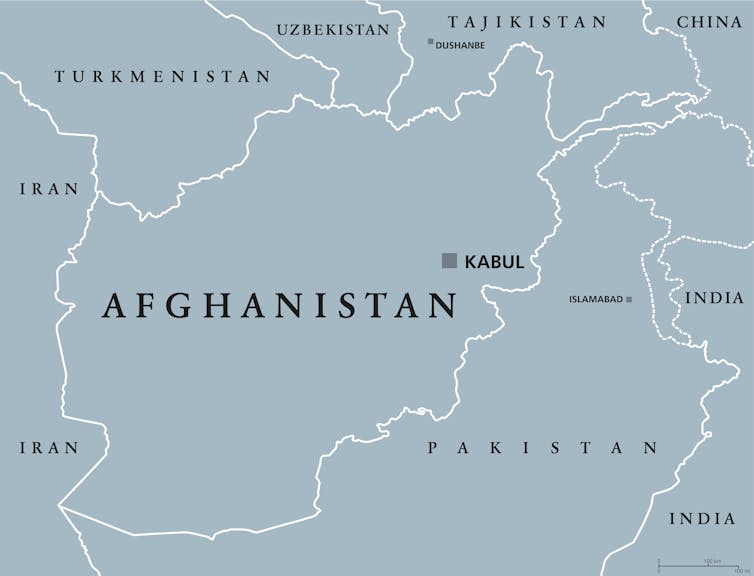Afghanistan: Taliban victory inevitable despite the trillions the US poured in


In less than a week, the nearly a dozen key cities in Afghanistan. With the departure of US forces, it is poised to take over the country from the embattled Afghan government.
Over the past 20 years, the US has poured into Afghanistan to oust the Taliban, an effort that was clearly unsuccessful. But a look at the countryās strategic geographic location and the politics of the region (including support for the Taliban) tells us that this outcome was inevitable.
Afghanistan is strategically located between central and south Asia ā a region rich in oil and natural gas. It has also struggled with efforts by different Afghanistan-based ethnic groups to create ancestral homelands. The Pashtun population (and to a lesser extent are particularly implicated in this.
For these and other reasons, Afghanistan has long faced constant meddling from the Soviet Union/Russia, UK, the US, Iran, Saudi Arabia, India and of course, Pakistan.
Pakistan
Afghanistanās relationship with Pakistan has been fraught with tension ever since the former was recognised as a sovereign state in 1919.
When Pakistan gained its independence in 1947, Afghanistan was the sole country to its formation in the United Nations. Some of the tension emanated from Afghanistanās refusal to recognise the Durand Line ā the hastily drawn 1,600 mile border that cut across thousands of Pashtun tribes in 1893.
Fearing calls from Pashtuns in both countries to create a national homeland that would cut through North Pakistan, Pakistan has long sought to turn Afghanistan into an Islamic client state ā supporting an Islamic identity (over a Pashtun one) in Afghanistan to gain strategic depth against India.

Pakistan helped to empower the Taliban in 1994 and has been Afghanistanās most involved neighbour. Through its top intelligence agency the ISI, it Taliban operations, recruited manpower to serve in Taliban armies and helped to plan and arm offensives. It has also occasionally been involved in direct combat support. The ISIās support for the Taliban was rooted in its aim to erase Pashtun nationalism. But in doing so it may have created a bigger problem for Pakistan, as Taliban rule has led to an exodus of .
Nevertheless, according to the Afghan government, there are elements within Pakistanās government, namely the ISI, that the Taliban, and ongoing instability in Afghanistan. Furthermore, Pakistan does not have a good relationship with other groups in Afghanistan, so it has little choice but to .
For Pakistanās government, a worst-case scenario is a protracted conflict, which could lead to another large into Pakistan.
Iran
±õ°ł²¹²Ōās , which borders it to the east, is also complicated by regional dynamics and its relationship with the US. As a Shia country, Iran has had long ideological differences with the Taliban. In the 1990s, it sought to make alliances, including with the US, to .
But two decades later, US relations with Iran are at an all-time low, affecting ±õ°ł²¹²Ōās stance on how to deal with the Taliban. Iran has mostly been hedging its bets ā supporting both the Afghan government and the Taliban to keep them divided. And improved relations with Qatar ā home to the Talibanās political office ā have also helped ±õ°ł²¹²Ōās relationship with the Taliban.
Russia and China
Russia is mostly concerned with preventing instability at its border with Afghanistan, and with keeping Afghanistan free of US influence. Since the 1990s Moscow has been with different groups in Afghanistan, including the Taliban, despite misgivings about the Talibanās possible support for terror groups.
These after the emergence of Islamic State in 2015. In the fight to defeat IS in Afghanistan, Russia saw the Talibanās interests coincide with its own.
Reports surfaced that Russia was and directly undermining US efforts there, even to kill US and allied soldiers. US intelligence has since in the bounty claims.
China, meanwhile, has always maintained with the Taliban. Chinaās main concern is with extending its influence westward to gain strategic depth against India and the US.
New alliances
For the moment, the rise of the Taliban has not translated into a rise in terrorist activity from groups like al-Qaeda against Afghanistanās neighbours ā a concern of the US pulling out of the region. Sensing the inevitability of the Talibanās ascension, opportunistic alliances have formed with almost all of Afghanistanās neighbours with the Taliban, except for India.
India has been mostly reluctant to engage with the Taliban, but recently , supported by Qatar. However, New Delhi has also made clear it will not support a violent overthrow of Kabul, Afghanistanās capital ā not yet controlled by the Taliban.
Currently, the beleaguered Afghan government claims that its neighbours are being too sanguine about the Taliban, its ability to reform and whether it will help Afghanistan achieve stability. Senior Afghan officials have warned that a Taliban victory will result in a consolidation of power of various terrorist groups if the Taliban allows them to to launch attacks.
More important than the Talibanās hospitality is its willingness to allow terror groups to in organised crime ā Afghanistan an attractive location for this as well.
The Talibanās resurgence has created an acute humanitarian crisis in Afghanistan alongside terrible . Amid the chaos, the prime minister of Pakistan, Imran Khan, has accused the US of a āmessā.
And yet, while many may criticise US President Joe Biden for pulling forces out, there is little likelihood, given all these regional forces at work, that the US could ever have achieved stability in Afghanistan ā no matter how long it stayed.![]()
This article is republished from under a Creative Commons license. Read the .
